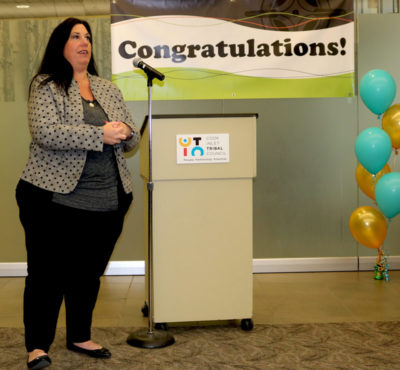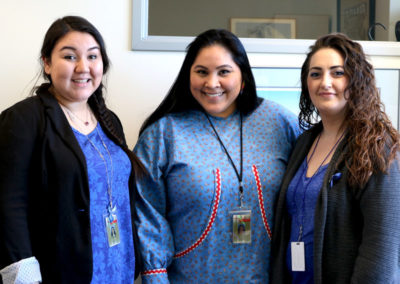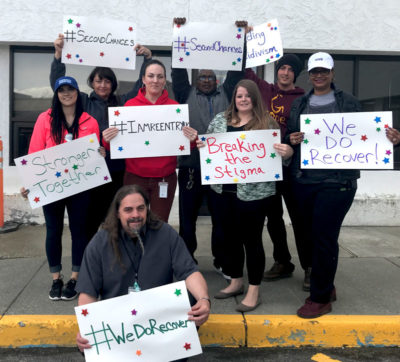One year after becoming a CITC subsidiary, the Alaska Native Justice Center looks back on its growth — and forward to its next phase

“Do more with less.” This is the constant struggle for most nonprofits — how to meet the growing needs of the increasing number of individuals seeking service, despite budget constraints and limited staff? Like other nonprofits, the Alaska Native Justice Center (ANJC) frequently asked this question as its employees worked to address the justice needs of Alaska Native and other people.
The answer came in the form of a new collaboration. In 2016, ANJC became a subsidiary of Cook Inlet Tribal Council (CITC). The new partnership was meant to more closely align ANJC’s services with CITC’s and to provide additional administrative and funding support for ANJC.
About a year and a half after this change, ANJC has grown tremendously and in more ways than one. But the growing pains normally experienced by a rapidly evolving organization have been eased by CITC’s administrative assistance. And thanks to the alliance between the two nonprofits, ANJC is planning for an even bigger and brighter future.
Growing Fast
As ANJC Director of Operations Tammy Ashley reflects on all that’s changed over the course of one year, she looks slightly astonished.
“We more than doubled our grants for advocacy and reentry,” she reviewed, singling out ANJC’s two main focus areas: Adult Reentry, which aims to effectively and successfully reintegrate those who have been in prison back into society; and Advocacy for Victims, which supports individuals who have been physically, emotionally, or sexually abused by a partner or are seeking assistance with civil legal issues related to family law. The Advocacy team also assists victims of human trafficking.
ANJC was already growing before its new partnership with CITC. The Advocacy team has expanded tremendously, with three new case managers, a project coordinator, a program manager, and a tribal liaison now on board. Reentry has grown as well, with five new employees, including two practicum students who are completing hours needed for their degrees. And nearly 70 percent of these new hires have been Alaska Native.
“We’ve grown so much in the last year,” Tammy explained. “Not just in terms of capacity, but because of that, we were able to take on all the people who came to us seeking assistance. We’ve nearly doubled the number of reentry participants we’re serving.”
More Staff Means More Services

ANJC’s enhanced capacity ensures that those who need justice help get it, while new methods of tracking participants’ cases provides greater consistency in service.
It also allows the organization to do more education about its services and to go outside of Anchorage to areas of the state where individuals might not have easy access to advocacy help. Already, ANJC has traveled to several communities across the state to raise awareness around its services. ANJC advocates can now also offer over-the-phone case management to those communities on a weekly basis.
“Privacy is a major barrier to getting help for victims of domestic violence or sexual assault who live in rural communities,” Tammy explained. “An individual may not want to go to the local shelter because someone who works there is related to them, or related to their abuser. That’s why access to case management outside the community is important. And if they need more, we will refer them to the right place to get help.”
What’s Next?

Over the next three years, ANJC plans to take its services to 18 different communities, in the hopes of establishing “hubs” from which surrounding smaller communities can also access assistance. Staff will work closely with partners like local tribes, CITC’s community liaisons, and Indian Child Welfare Act advocates to see how they can address specific justice issues. Back in Anchorage, ANJC is becoming more integrated with other advocacy organizations like Standing Together Against Rape (STAR), Alaska Legal Services, AWAIC, and Hope Community Resources.
But increased advocacy is just one of several goals the organization has for the near future.
ANJC also aims to develop a youth-focused program that would offer mentoring, support for education and employment, and other services that would prevent at-risk youth from entering the system. The organization is also interested in reaching youth interested in careers in the criminal justice system. In 2019, ANJC will provide logistical support for the Color of Justice program, which introduces youth to law-related opportunities.
“We’re also looking at broadening our client base,” Tammy shared, adding that she hopes to facilitate training for some of ANJC’s case managers to be able to work with sex offenders. “It’s difficult for sex offenders to find treatment or a reentry program that will accept them, which makes it hard for them to comply with their requirements to stay out of prison. That’s a need we could meet.”
The Power of Partnership

How is all this possible? Tammy cites the partnership between CITC and ANJC.
“Since we became a subsidiary, we’ve been able to apply for more grants,” she elaborated. “Through collaboration with CITC’s Human Resources department, we were able to really look at our internal policies and procedures, we’ve gotten support for employee issues and strategic hiring, plus we have access to new employee orientation and training opportunities. CITC Accounting has taken on our finances and budget. We have computer support from CITC’s Information Technology department and development help from CITC’s fundraising staff, which made our Voices for Justice event last year a huge success. This integration has been very successful — we are part of the CITC family.”
The joining of CITC’s forces with ANJC’s specialized focus on justice issues is a testament to the power of partnership.
